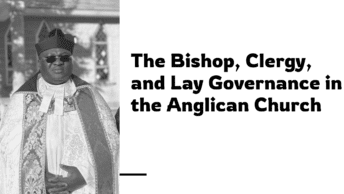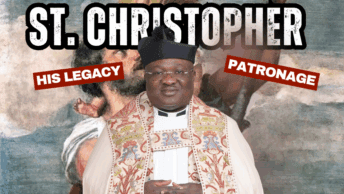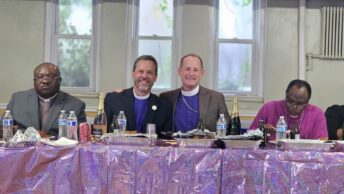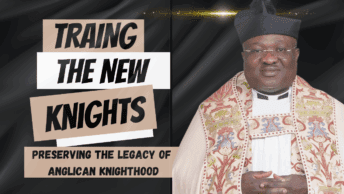A Critical Reflection on Catholic–Anglican Relations in Nigeria
A Paper Presented at the Clergy Conference
New Jersey, USA, 2022
By
The Ven. Dr. David Chimezie Nwanekpe
Rector, Anglican Church of the Holy Spirit, Bronx, New York
Chaplain, Council of Knights (CONNAM), USA
Honorary Doctor of Theology
Academic Credentials:
- M.A. Peace and Conflict Resolution (Strategic PCR), Imo State University
- M.Th. Theology
- B.A. (Hons) Religion, University of Nigeria, Nsukka
- B.Th. (Hons), Diploma in Theology
Abstract
In most parts of the world, Roman Catholics and Anglicans have taken significant steps toward mutual understanding, dialogue, and unity. However, in Nigeria, relations between the Catholic Church and the Anglican Communion have often been characterized by rivalry and suspicion. This paper argues that such hostility is not rooted in theology alone but is largely a colonial import—specifically the historical rivalry between Irish Catholic missionaries and British Anglican missionaries. By examining the Irish–British background, the Nigerian experience, and contemporary contrasts with ecumenical contexts such as New York, the paper calls for Nigerian Christians to transcend these inherited conflicts and rediscover their common witness to Christ.
Introduction
Why do Nigerian Catholics and Anglicans often see themselves as adversaries rather than partners in Christ’s mission? Why do we, in Nigeria, continue to perpetuate quarrels that are not of our making?
Having lived and ministered in New York for several years, I have personally witnessed the striking difference: here, the Anglican (Episcopal) Church and the Roman Catholic Church relate with warmth, cooperation, and mutual respect. They share pulpits during ecumenical services, stand together on social issues, and acknowledge one another as genuine partners in faith.
In Nigeria, however, Catholics and Anglicans sometimes act as though they are destined enemies. This paradox raises urgent questions: What exactly went wrong? Where did this bitterness originate? And how do we move beyond it?
Historical Background: The Irish–British Legacy
The Catholic missions that took root in Nigeria were predominantly Irish-led. Following the 19th-century decline of Catholicism in Europe, Ireland emerged as a hub of missionary zeal, sending priests and nuns to Africa. Their missionary energy was deeply tied to their identity as an oppressed but resilient people under British rule.
The Anglican missions, by contrast, were firmly British, represented largely through the Church Missionary Society (CMS). The CMS enjoyed close alignment with British colonial administrators, who trusted Anglican missions to advance education, literacy, and governance in a way compatible with colonial objectives.
Thus, from the outset, Nigerian Christianity became an arena where Irish resentment against British domination was indirectly played out. The Irish missionaries often regarded the Anglicans as agents of imperialism, while Anglicans viewed Catholics as competitors undermining their educational and political foothold. Lamin Sanneh rightly notes that missionaries carried their own cultures and conflicts into Africa (Translating the Message, 2009).
Nigerian Reality: A Religion of Suspicion
By the early 20th century, these European rivalries had been fully planted in Nigeria. Catholics built schools, Anglicans built schools. Catholics produced catechisms, Anglicans produced their own. Each side sought dominance in education, politics, and public recognition.
Elizabeth Isichei, in A History of Christianity in Africa (1995), observes that denominational competition in Nigeria was unusually fierce, and much of it was fueled not by theology but by missionary politics. This explains why Catholics and Anglicans in Nigeria often perceive one another through a lens of suspicion, despite sharing much in terms of faith, sacraments, and moral teaching.
A Global Contrast: Lessons from New York
My years in New York have shown me a different reality. Here, Catholics and Anglicans do not fight over converts or parade themselves as rivals. Instead, they collaborate on charity, justice, education, and community building.
The ecumenical spirit, nurtured by Vatican II and Anglican–Roman Catholic International Commission (ARCIC) dialogues, has borne fruit in Western contexts.
Why then do we in Nigeria persist in fighting battles that others have long left behind? Why must Nigerian Catholics and Anglicans carry the rancor of Ireland and Britain, while Catholics and Anglicans in America have found common ground?
The answer is painful: we have failed to separate European colonial baggage from the Gospel of Jesus Christ.
Theology or Imported Politics?
One may ask whether theological differences are to blame. Indeed, there are doctrinal disagreements: papal authority, Marian devotion, sacramental theology. Yet these differences exist worldwide, not only in Nigeria.
What makes Nigeria unique is not the theology but the hostility—the inherited psychology of competition.
When a Catholic in Nigeria despises an Anglican, or an Anglican mocks a Catholic, it is rarely about papal infallibility or eucharistic theology. It is about inherited mistrust, taught through generations of missionary rivalry. The tragedy is that these divisions blind us to our shared identity as Christians.
A Human Appeal: Why Must We Fight?
Beloved Nigerian Christians, I must ask: why do we continue to fight? Why do we assume that Catholics and Anglicans must be at war? Why should my neighbor be my rival simply because he worships across a different altar?
These questions weigh heavily on my heart because I have seen another way. I have seen cooperation, love, and unity in the United States. I have seen Anglicans and Catholics share the same vision of Christ, without rancor.
The Nigerian Church must therefore ask: what witness do we give to the world when our first language to one another is suspicion? Can the Body of Christ be divided against itself and still thrive?
Toward Healing and Reconciliation
To heal these wounds, Nigerian Christians must:
- Acknowledge the Colonial Roots – Understand that our hostility is not purely Nigerian but imported from Europe.
- Reclaim the Gospel – Rediscover that Christ calls us to unity, not rivalry (John 17:21).
- Promote Ecumenical Education – Both seminaries and parishes must teach the history of these divisions, not to inflame them but to heal them.
- Model Cooperation – Nigerian bishops, priests, and lay leaders must collaborate in schools, hospitals, and social work, showing that unity is possible.
- Preach Reconciliation – From the pulpit to the street, Christians must be reminded that denominational loyalty is not greater than loyalty to Christ.
Conclusion
The rift between Catholics and Anglicans in Nigeria is not inevitable. It is not the Gospel. It is not even authentically African. It is the unfortunate legacy of Irish–British enmity, planted in our soil by missionaries who themselves carried wounds from Europe.
But the time has come for Nigeria to say, No more. No more fighting over borrowed quarrels. No more suspicion when Christ calls us to love. No more rivalry when our real enemy is not each other but sin, injustice, and brokenness in our society.
If in New York, Catholics and Anglicans can stand side by side, why not in Lagos, Onitsha, or Owerri? If across the world, the spirit of ecumenism has triumphed over centuries of division, why should Nigeria remain chained to old quarrels?
We owe it to ourselves, to our children, and to the Gospel of Christ to let go of these imported crises. The future of Christianity in Nigeria depends not on our ability to compete but on our courage to forgive, to reconcile, and to walk together as one family of God.
References
- Isichei, Elizabeth. A History of Christianity in Africa: From Antiquity to the Present. Grand Rapids: Eerdmans, 1995.
- Sanneh, Lamin. Translating the Message: The Missionary Impact on Culture. 2nd ed. Maryknoll: Orbis Books, 2009.
- Hastings, Adrian. The Church in Africa, 1450–1950. Oxford: Clarendon Press, 1994.
- Anglican–Roman Catholic International Commission (ARCIC). Agreed Statements. 1969–2017.









Very insightful. The Cruz of the essay is very Lucille conveyed. Thanks dearly beloved father in God.
Very insightful. The Cruz of the essay is very Lucille conveyed. Thanks dearly beloved father in God.